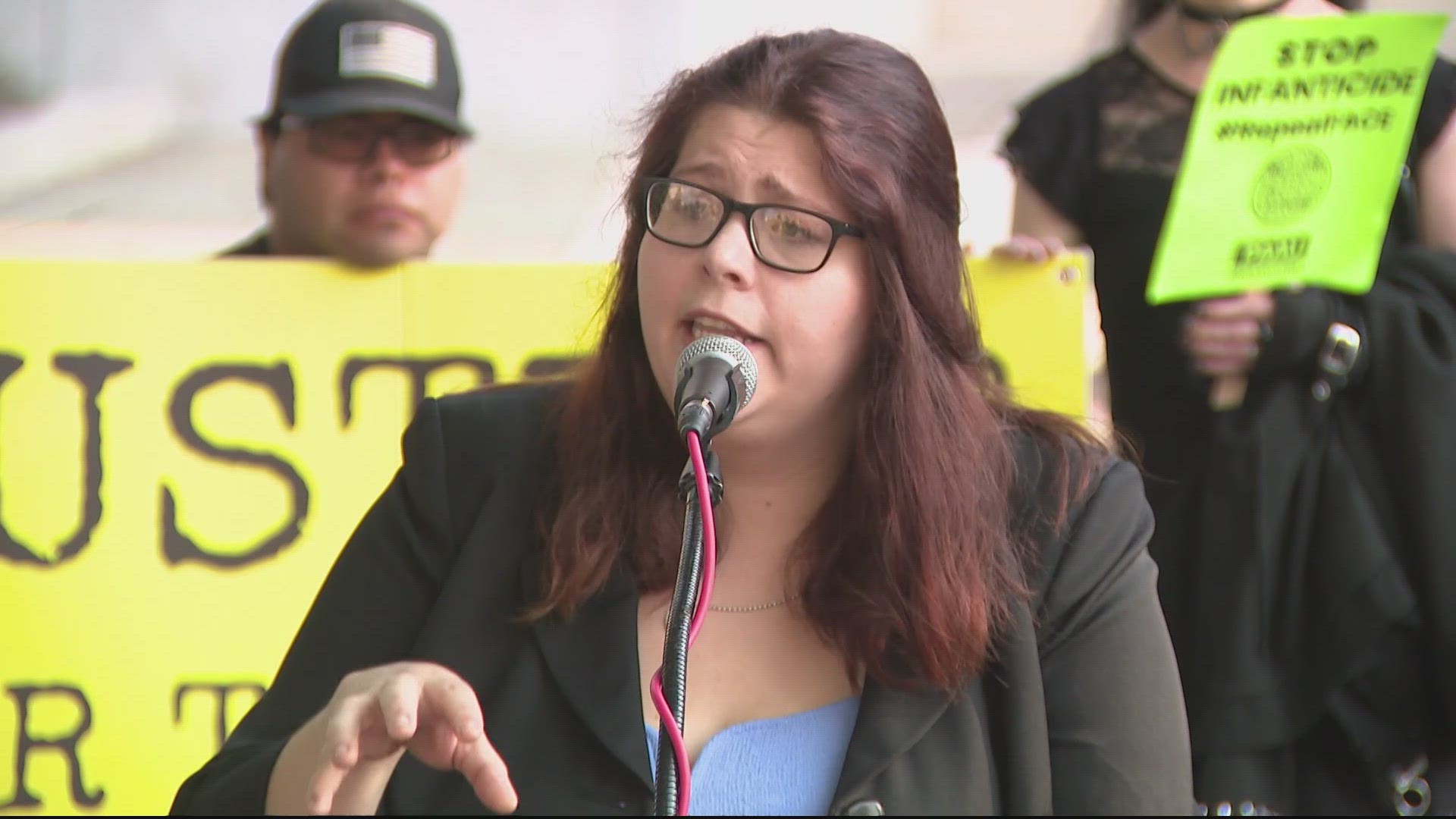WASHINGTON — Attorneys for an anti-abortion activist convicted of violating federal law by plotting to blockade a D.C. clinic made an emergency request Wednesday for a judge to release her from jail while she awaits sentencing.
A jury convicted Lauren Handy and four co-defendants Tuesday of two felony counts each of conspiracy against rights and violating the Freedom of Access to Clinic Entrances (FACE) Act. At trial, prosecutors described Handy as the leader of a plot to blockade the Washington Surgi-Clinic on F Street in October 2020. Video from the blockade shows several of Handy’s co-defendants using ropes and chains to tie themselves to chairs in front of one clinic entrance while others stood in front of a second door and refused to let patients through.
In a move that caught defense attorneys off-guard, U.S. District Judge Colleen Kollar-Kotelly ordered all five defendants remanded into custody while they await sentencing because they had been convicted of a crime of violence. Kollar-Kotelly cited a federal statute that says judges “shall order” defendants convicted of serious felony crimes of violence held after conviction unless they believe they have a substantial likelihood of winning a motion for acquittal or a new trial or the government recommends a sentence without prison time.
Although a clinic employee suffered an ankle injury when members of the anti-abortion group forced their way into the clinic, none of the defendants was charged with assault or causing injury. However, the FACE Act requires jurors to decide whether the offense was “exclusively a nonviolent physical obstruction” or involved the use of force. The jury decided as part of its verdict Tuesday that the conspiracy to blockade the Surgi-Clinic was not exclusively nonviolent.
Handy’s attorneys filed an emergency motion Wednesday morning arguing Kollar-Kotelly had erred in ordering her and the other defendants into custody because the FACE Act is not “categorically” a crime of violence. The motion argues Handy and the others should have been released to await sentencing under a more lenient provision that only requires judges to consider whether defendants pose an ongoing danger or are likely to flee.
“Ms. Handy is a prominent national nonprofit leader,” Handy’s attorneys wrote. “In 2017, she founded Mercy Missions, a mutual aid organization dedicated to helping families and mothers in crisis pregnancies and providing survival aid for houseless people. Her charitable work and desire to help people and particularly families have led to previous arrests and charges for, primarily, trespassing. There is no evidence that Ms. Handy poses a danger to the safety of any person or the community.”
Handy was convicted last year and sentenced to 30 days in jail for trespassing at an Alexandria women’s clinic in 2021 and to 45 days in jail for obstructing a Michigan clinic’s operations in 2019. Handy was also ordered by Kollar-Kotelly in February not to “conspire, plan, instruct, assist, abet, direct, or otherwise aid in any way” others from entering reproductive services clinics after she acknowledged she’d planned two additional clinic invasions while on pretrial release.
Handy also made headlines in March 2022 when she reported possessing more than 100 fetal remains in her Capitol Hill apartment. No charges were ever filed in connection with that report. Kollar-Kotelly barred Handy’s attorneys from entering photos of the remains as evidence at trial.
Attorneys for Handy have promised to appeal her conviction and challenge the constitutionality of the FACE Act. In a pretrial motion, they argued the case should have been dismissed outright following the Supreme Court's landmark decision overturning Roe v. Wade last year — although that motion was denied by Kollar-Kotelly.
“In the end, I think this case is far from over," one of Handy's attorneys, Steve Crampton, told WUSA9. "Miss Handy is a person who has the courage of her convictions. Willing to do time – obviously doesn’t want to do time. While she will fight on, we intend to fight on as well at the Thomas More Society.”
Although Kollar-Kotelly indicated in court Tuesday she felt her hands were tied by the statute, other federal judges in D.C. have allowed defendants convicted of serious crimes to remain on release after conviction – including in numerous Jan. 6 cases. In September, U.S. District Judge Amit P. Mehta allowed former NYPD Officer Thomas Webster to self-report to authorities after sentencing him to 10 years in prison for violently and repeatedly assaulting a DC Police officer during the Capitol riot. Webster was wearing his NYPD-issued bulletproof vest and used a flagpole to strike at officers multiple times before tackling one to the ground and attempting to rip off his gas mask. In July, another judge convicted Federico Klein – a State Department appointee of former President Donald Trump – of six felony counts for joining the prolonged assault on police in the Lower West Terrace Tunnel on Jan. 6. Over the objection of the government, Klein was also allowed to return home to await sentencing on Nov. 3.
Handy was represented at trial by Crampton and Martin Cannon, of the anti-abortion law firm The Thomas More Society, and Dennis Boyle and Blerina Jasari, of the D.C.-based law firm Boyle & Jasari. A second group of defendants is scheduled to begin trial on the same charges as Handy next week.

